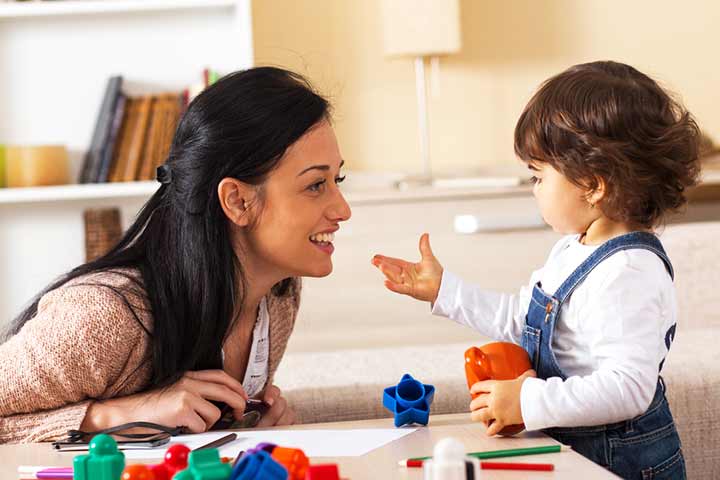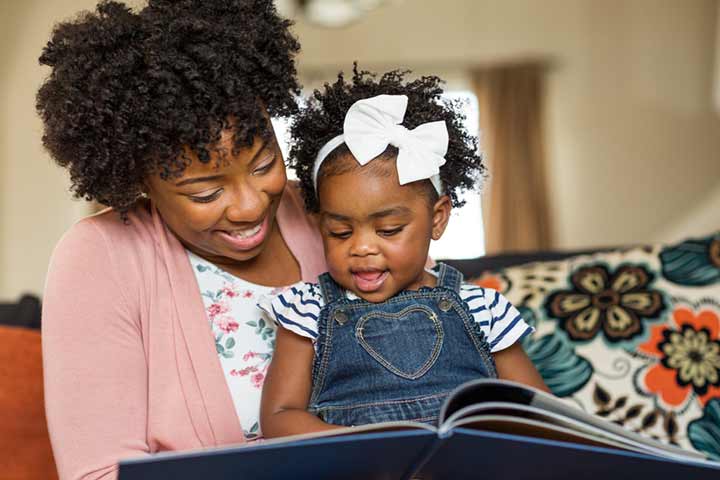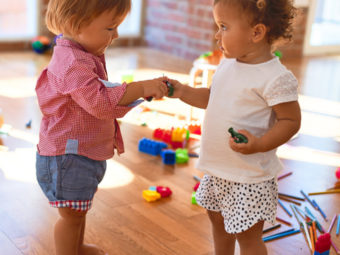
When you have a baby, one of the most important things that every parent wishes for is that their baby reaches their milestones without facing any issues or problems. Especially if you have other friends who’ve also given birth around the same time as you, the competition becomes a little more than obvious. Every time you meet these fellow parents, you tend to compare how much your baby has grown and what milestones they’ve crossed. While this is a great way to keep track of your baby’s milestones, it could also be a cause for concern and worry if they haven’t crossed that milestone that every other baby their age has. Speech is one of those milestones.
Image: Shutterstock
Ideally, a baby says their first words somewhere between 9-12 months. By the time they are about two years old, they can say around 50 words and even start putting them together in short, simple sentences (1). But some kids take longer, and it’s usually not a cause for concern. However, when fellow parents ask you why your kids aren’t talking yet and brag about their kids talking, you are at a loss for words.
We understand your apprehension, and we are here to help you. Scroll below to find out a few things to keep in mind when your child hasn’t started talking yet:
1. Only Consider The Opinion Of Your Child’s Pediatrician
Image: Shutterstock
If you’re worried about your toddler’s delay in speech or have concerns about their speech development, consult a medical professional. Several people around you will bombard you with opinions and advice on what to do to make your little one start talking. Ignore them. The best way to address your concern is by consulting a pediatrician.
2. Try To Keep Your Cool
Image: Shutterstock
Whether it is your relatives, cousins, in-laws, parents, siblings, or friends, the numerous comments that come your way when your child hasn’t said their first words yet could piss you off. Try to remember that they come from a place of love and concern (well, most of it), and don’t lose your composure.
3. Less Is More
Image: Shutterstock
People might come at you with several comments that compel you to give them an explanation of why your toddler hasn’t started speaking yet. Our advice to you is to stop. They don’t need to hear it. No one needs to get voluntary information from you regarding your child’s developmental milestones. It’s best to give them very little information. Remember that less is more.
4. Learn A Simple Response
Image: Shutterstock
If your in-laws, parents, or other close circle demands to know answers, but you are not very comfortable sharing information with them, it’s best to give them a simple and self-explanatory response. For example, tell your parents that your little one has an appointment with a speech specialist in the coming week. A reply like this will not warrant further questions that probe into your child’s life. Or you could respond with humor, saying that, like Einstein, your child might be a genius too!
5. Balance It Out
Image: Shutterstock
即使你的孩子重击的人讲话opmental issues, it’s absolutely alright. But your inner protective mamma bear kicks in, and you’d want to ward off anyone coming close to your child with judgment and insensitive comments. Therefore, remember that it’s a balancing act. You have to protect your child, take care of their needs and be willing to give the people around you (at least your close circle of friends and family) an explanation as to why your child hasn’t started talking yet.
It’s not easy to raise a child. Moreso, if your child is a special needs kid. But remember that there is no point in panicking and worrying about it. Instead, consult medical professionals and ensure your little one gets the care that they need. Who knows, after a few years, you might be wishing they stop talking because of how much they talk! (JK, wink). What are your thoughts on this article? Comment below and let us know if you faced similar challenges with your toddler!


















